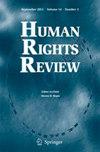转型时代的人权法律教育:缅甸法律导师的观点与实践
IF 1.3
Q1 LAW
引用次数: 0
摘要
这项混合方法研究考察了在2021年政变结束的民主转型期间缅甸法律教育者的人权和人权教育与培训(HRET)观点和实践。“背景、理论和方法框架”概述了缅甸的法律和人权教育,讨论了民主转型期间法学院人权教育的潜力,阐述了为什么教育者的人权和人权教育观点和实践是重要的,并介绍了研究方法。“调查结果”展示了基于过渡时期两个研究阶段的调查结果:第一阶段(2015-2017)——参与多年HRET项目后法律教师的观点和实践;第二阶段(2019-2020年)——法律教师对缅甸HRET目标、挑战和潜力的看法。第三部分-“讨论和影响”-探讨人权教育的背景挑战和机遇,涉及(1)关键人权教育,(2)以实践为导向的HRET,以及(3)大学内人权和HRET的行政政策和实践。本文章由计算机程序翻译,如有差异,请以英文原文为准。
Human Rights Legal Education in Times of Transition: Perspectives and Practices of Law Instructors in Myanmar
Abstract This mixed-methods study examines the human rights and human rights education and training (HRET) perspectives and practices of law educators in Myanmar during the democratic transition that ended with the 2021 coup. “Contextual, Theoretical, and Methodological Framing” provides an overview of legal and human rights education in Myanmar, discusses the potential of human rights education in law schools during democratic transitions, addresses why educators’ human rights and human rights education perspectives and practices are important to examine, and presents the research methodology. “Findings” presents findings based on the two phases of research during the transitional period: phase 1 (2015–2017)—law instructors’ perspectives and practices after participating in a multi-year HRET program; and phase 2 (2019–2020)—law instructors’ perspectives on the goals, challenges, and potential of HRET in Myanmar. The third section—“Discussion and Implications”—examines the contextual challenges and opportunities for human rights education as related to (1) critical human rights education, (2) practice-oriented HRET, and (3) administrative policies and practices for human rights and HRET within universities.
求助全文
通过发布文献求助,成功后即可免费获取论文全文。
去求助
来源期刊

Human Rights Review
LAW-
CiteScore
2.70
自引率
14.30%
发文量
22
期刊介绍:
Human Rights Review is an interdisciplinary journal which provides a scholarly forum in which human rights issues and their underlying empirical, theoretical and philosophical foundations are explored. The journal seeks to place human rights practices and policies within a theoretical perspective in order to link empirical research to broader human rights issues. Human Rights Review welcomes submissions from all academic areas in order to foster a wide-ranging dialogue on issues of concern to both the academic and the policy-making communities. The journal is receptive to submissions drawing from diverse methodologies and approaches including case studies, quantitative analysis, legal scholarship and philosophical discourse in order to provide a comprehensive discussion concerning human rights issues.
 求助内容:
求助内容: 应助结果提醒方式:
应助结果提醒方式:


